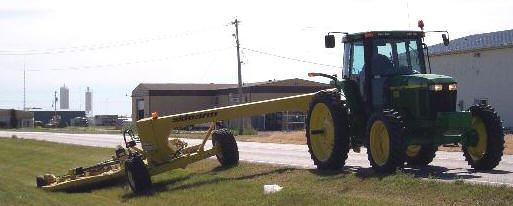Agricultural Services maintains rural ditches to improve visibility and ensure safe road travel, allow proper drainage to prevent flooding, and prevent weeds from spreading to protect the environment and surrounding agricultural land. The Roadside Vegetation Control Program controls weeds, brush, and trees on rural roadsides and municipal reserves. Control methods include:
- tree/brush control
- mowing
- spraying
- seeding
View the MD of Taber's Vegetation Management Policy.
| Questions? |
|---|
| Call 403-223-8735 Monday - Friday 8:00 am - 4:30 pm |
Expand the blue (+) tabs below to learn more.
Roadside tree/brush control
Agricultural Services focuses on a set of key priorities that pertain to the effective management of roadside vegetation. These priorities include:
- Ensuring clear sightlines at intersections, particularly within a 300-meter triangle of vision.
- Identifying and addressing hazardous or overhanging trees that may impede road traffic.
- Managing concerns related to snow drifting, which can be exacerbated by vegetation.
- Addressing trees and brush that encroach upon utility right-of-ways within our jurisdiction.
- Mitigating risks associated with hazardous or overhanging trees in proximity to sidewalks and intersections within our hamlets.
Roadside Tree and Brush Control form an integral part of our strategy. This program involves the systematic removal of trees and brush along the roadside, preventing them from naturally decomposing in the ditch over time. These activities yield several benefits, such as improving visibility at intersections and alongside roadways, enhancing snow-clearing efficiency during the winter months, and optimizing drainage systems.
It is important to note that brushing and mulching activities are exclusively carried out within municipally-owned ditches and roadsides within the Municipal District of Taber. Ornamental trees located near approaches and shelterbelts on private property are not subject to removal as part of this program.
Furthermore, our municipality is committed to maintaining open lines of communication and collaboration with all adjacent landowners. Before any work commencement, we seek and obtain permission from landowners and adhere rigorously to established safety protocols. These operations are primarily executed during the period from November to April, contingent upon favourable weather conditions.
Equipment utilized:
- 1 Tractor with a bucket attachment
- 1 Tandem dump truck
- 1 Woodchipper
- 6 Chainsaws
- 2 Trucks
- 1 Trailer
Roadside mowing

Agricultural Services establishes a hierarchical order for the management of roadside vegetation, guided by the following considerations:
- Municipal Right-of-Ways
- Lease Roads
- Road Construction Projects
- Airports (Taber and Vauxhall)
- Hamlets, Parks, Cemeteries, and Landfills
- Undeveloped Road Allowances
- Contracted Mowing on Highways (Volker Stevin)d
The objective of our mowing activities is twofold: to maintain short roadside vegetation, thereby enhancing visibility and safety for residents travelling along rural roads, while also facilitating proper drainage and contributing to the control of weed proliferation and snow drifts. It is imperative to note that all roadside mowing equipment is mandated to operate with both headlights and 4-way flashers activated.
In our prescribed schedule, range and township roads undergo biannual mowing, ensuring alignment with the requirements of various municipal departments and external agencies. It is pertinent to mention that the mowing of undeveloped road allowances will only be considered for areas deemed free from rocks and debris, with safety being of paramount concern. Before initiating mowing activities at airports, we maintain open lines of communication to confirm adherence to safety regulations.
Equipment utilized:
- Four (4) Tractors with a horsepower rating of 125 hp each
- Four (4) 15' Rotary Mowers
- Four (4) Sidearms
Roadside seeding
Agricultural Services is responsible for the reseeding of grass on newly constructed roadways, borrow areas, and reclamation sites within the jurisdiction of the Municipal District of Taber. Furthermore, the department plays a pivotal role in guiding contractors and developers engaged in the seeding of new roadsides and utility right-of-ways.
Any contractors or developers involved in the seeding of roadsides or utility right-of-ways must adhere to the stringent guidelines established by the Agricultural Service Board. These guidelines encompass precise specifications about seed quality and the specific seed varieties to be utilized. Additionally, before starting any seeding activities, all seeds must possess a valid certificate of seed analysis, as issued by the supplier. This rigorous protocol is in place to ensure the utilization of high-quality seed that is devoid of any weed contaminants.
Equipment utilized:
- 1 Tractor equipped with a 10-foot drill
- 1 Quad outfitted with seeding equipment
Roadside spraying
In addition to the routine maintenance practices of vegetation control, such as brushing and mowing, Agricultural Services employs selective herbicide spraying as a strategic tool for weed management within municipal road allowances.
The MD of Taber proactively addresses weeds and plant species that have been classified as noxious or prohibited noxious under the Alberta Weed Act to mitigate their potential encroachment onto private properties.
Annually, the MD of Taber ensures the application of approved herbicides to all municipal right-of-ways, ditches, and road allowances, adhering strictly to product labels and regulatory mandates.
Please note
All herbicide spraying activities are carried out by duly licensed pesticide applicators, guaranteeing the highest standards of safety and professionalism. Typically, the spraying season commences in June and concludes in July.
